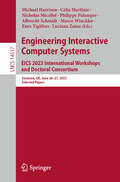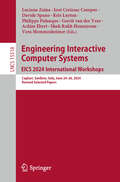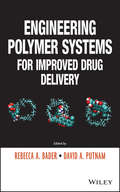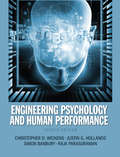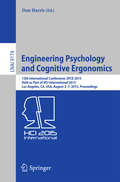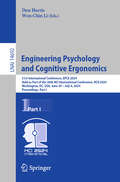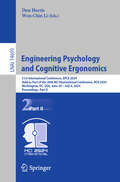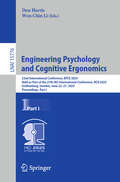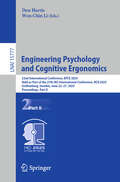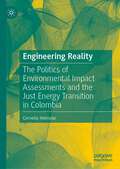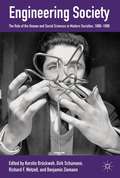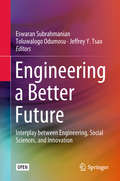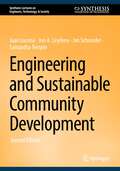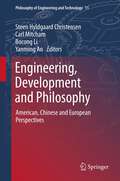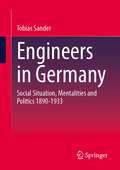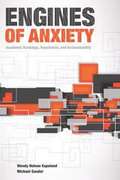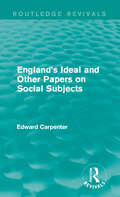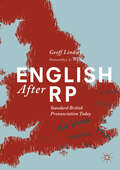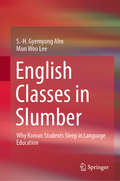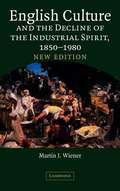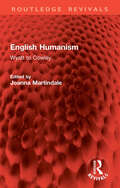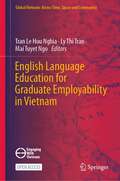- Table View
- List View
Engineering Interactive Computer Systems. EICS 2023 International Workshops and Doctoral Consortium: Swansea, UK, June 26-27, 2023, Selected Papers (Lecture Notes in Computer Science #14517)
by Michael Harrison Marco Winckler Philippe Palanque Albrecht Schmidt Célia Martinie Nicholas Micallef Enes Yigitbas Luciana ZainaThis book presents a series of revised papers selected from the Doctoral Consortium (DC) and the Workshops organized in conjunction with the 15th ACM SIGCHI Symposium on Engineering Interactive Computing Systems (EICS 2023) which was held in Swansea, United Kingdom, during June 27-30, 2023. The 17 full papers included in this book were carefully reviewed and selected from 33 submissions. They were organized in topical sections as follows: engineering interactive computing systems for people with disabilities (DISAB 2023 Workshop), engineering interactive systems embedding AI technologies (EIS-embedding-AI Workshop) and doctoral consortium EICS 2023.
Engineering Interactive Computer Systems. EICS 2024 International Workshops: Cagliari, Sardinia, Italy, June 24–28, 2024, Revised Selected Papers (Lecture Notes in Computer Science #15518)
by Philippe Palanque Achim Ebert Shah Rukh Humayoun Gerrit van der Veer Kris Luyten Luciana Zaina José Creissac Campos Davide Spano Vera MemmesheimerThis book presents a series of revised papers selected from the Workshops organized in conjunction with the 16th ACM SIGCHI Symposium on Engineering Interactive Computing Systems (EICS 2024) which was held in Cagliari, Italy, during June 24–26, 2024. The 18 full papers included in this book were carefully reviewed and selected from 22 submissions. They were organized in topical sections as follows: Engineering Interactive Systems Embedding AI Technologies (EISEAIT 2024 Workshop); and Experience 2.0 and Beyond – Engineering Cross Devices and Multiple Realities (EXDMR 2024).
Engineering Polymer Systems for Improved Drug Delivery
by David A. Putnam Rebecca A. BaderPolymers have played a critical role in the rational design and application of drug delivery systems that increase the efficacy and reduce the toxicity of new and conventional therapeutics. Beginning with an introduction to the fundamentals of drug delivery, Engineering Polymer Systems for Improved Drug Delivery explores traditional drug delivery techniques as well as emerging advanced drug delivery techniques. By reviewing many types of polymeric drug delivery systems, and including key points, worked examples and homework problems, this book will serve as a guide to for specialists and non-specialists as well as a graduate level text for drug delivery courses.
Engineering Psychology & Human Performance: International Edition
by Raja Parasuraman Christopher D. Wickens Simon Banbury Justin G. HollandsForming connections between human performance and design Engineering Psychology and Human Performance, 4e examines human-machine interaction. The book is organized directly from the psychological perspective of human information processing. The chapters generally correspond to the flow of information as it is processed by a human being--from the senses, through the brain, to action--rather than from the perspective of system components or engineering design concepts. This book is ideal for a psychology student, engineering student, or actual practitioner in engineering psychology, human performance, and human factors Learning Goals Upon completing this book, readers should be able to: * Identify how human ability contributes to the design of technology. * Understand the connections within human information processing and human performance. * Challenge the way they think about technology's influence on human performance. * show how theoretical advances have been, or might be, applied to improving human-machine interaction
Engineering Psychology and Cognitive Ergonomics
by Don HarrisThis is the sixth edited volume of refereed contributions, from an international group of researchers and specialists. Volumes five and six comprise the edited proceedings of the Third International Conference on Engineering Psychology and Cognitive Ergonomics, organized by Cranfield College of Aeronautics, Edinburgh, Scotland, October 2000. The applications areas include aerospace and other transportation, medicine, human-computer interaction, process control, and training technology. Topics addressed include: the design of control and display systems; human perception, error, reliability, information processing, and performance modelling; mental workload; stress; automation; situation awareness; skill acquisition and retention; techniques for evaluating human-machine systems and the physiological correlates of performance. Both volumes will be useful to applied and occupational psychologists, instructors, instructional developers, equipment and systems designers, researchers, government regulatory personnel, human resource managers and selection specialists; also to senior pilots, air traffic control and aviation and ground transportation operations management.
Engineering Psychology and Cognitive Ergonomics: 21st International Conference, EPCE 2024, Held as Part of the 26th HCI International Conference, HCII 2024, Washington, DC, USA, June 29 – July 4, 2024, Proceedings, Part I (Lecture Notes in Computer Science #14692)
by Don Harris Wen-Chin LiThis two-volume set LNAI 14692–14693 constitutes the thoroughly refereed proceedings of the 21st International Conference on Engineering Psychology and Cognitive Ergonomics, EPCE 2024, held as part of HCI International 2024,held in Washington, DC, USA, during June 29 - July 4, 2024. The total of 1271 papers and 309 posters included in the HCII 2024 proceedings was carefully reviewed and selected from 5108 submissions. The papers included in the HCII-EPCE two-volume set were organized in topical sections as follows: Part I: Cognitive Processes and Performance in High-Stress Environments; Decision-Making Support and Automation. Part II: Engineering Psychology and User Experience; Human Factors in Aviation.
Engineering Psychology and Cognitive Ergonomics: 21st International Conference, EPCE 2024, Held as Part of the 26th HCI International Conference, HCII 2024, Washington, DC, USA, June 29 – July 4, 2024, Proceedings, Part II (Lecture Notes in Computer Science #14693)
by Don Harris Wen-Chin LiThis two-volume set LNAI 14692–14693 constitutes the thoroughly refereed proceedings of the 21st International Conference on Engineering Psychology and Cognitive Ergonomics, EPCE 2024, held as part of HCI International 2024,held in Washington, DC, USA, during June 29 - July 4, 2024. The total of 1271 papers and 309 posters included in the HCII 2024 proceedings was carefully reviewed and selected from 5108 submissions. The papers included in the HCII-EPCE two-volume set were organized in topical sections as follows: Part I: Cognitive Processes and Performance in High-Stress Environments; Decision-Making Support and Automation. Part II: Engineering Psychology and User Experience; Human Factors in Aviation.
Engineering Psychology and Cognitive Ergonomics: 22nd International Conference, EPCE 2025, Held as Part of the 27th HCI International Conference, HCII 2025, Gothenburg, Sweden, June 22–27, 2025, Proceedings, Part I (Lecture Notes in Computer Science #15776)
by Don Harris Wen-Chin LiThis two-volume set constitutes the thoroughly refereed proceedings of the 22nd International Conference on Engineering Psychology and Cognitive Ergonomics, EPCE 2025, held as part of HCI International 2025, held in Gothenburg, Sweden, during June 22–27, 2025. Two volumes of the HCII 2025 proceedings are dedicated to this year&’s edition of the EPCE conference. The first volume centers around a diverse array of interconnected themes related to human performance, workload and situational awareness in the use of complex interactive applications and environments, as well as the role of cognitive psychology on designing and evaluating interactive systems and investigating computer-supported as in collaboration and teaming. The second volume focuses on issues related to Cognitive Psychology in the demanding contexts of aviation and space.
Engineering Psychology and Cognitive Ergonomics: 22nd International Conference, EPCE 2025, Held as Part of the 27th HCI International Conference, HCII 2025, Gothenburg, Sweden, June 22–27, 2025, Proceedings, Part II (Lecture Notes in Computer Science #15777)
by Don Harris Wen-Chin LiThis two-volume set constitutes the thoroughly refereed proceedings of the 22nd International Conference on Engineering Psychology and Cognitive Ergonomics, EPCE 2025, held as part of HCI International 2025, held in Gothenburg, Sweden, during June 22–27, 2025. Two volumes of the HCII 2025 proceedings are dedicated to this year&’s edition of the EPCE conference. The first volume centers around a diverse array of interconnected themes related to human performance, workload and situational awareness in the use of complex interactive applications and environments, as well as the role of cognitive psychology on designing and evaluating interactive systems and investigating computer-supported as in collaboration and teaming. The second volume focuses on issues related to Cognitive Psychology in the demanding contexts of aviation and space.
Engineering Reality: The Politics of Environmental Impact Assessments and the Just Energy Transition in Colombia
by Cornelia HelmckeEngineering Reality offers unprecedented insights into the power of environmental impact assessments in engineering a reality favourable to any investment, focusing on the highly contested environmental study of a large hydroelectric dam project in southern Colombia, El Quimbo. The inclusion of environmental impact assessments to project proposals of environmental influence has been an undeniably important step to environmental governance in many countries around the world. Regarding the science behind these studies as objective and their results as the closest in representing reality, however, is misleading. Many activists and scholars made it their mission to uncover the limitations and work towards filling the gaps. Participation processes are considered key to any successful evaluation, but local knowledges and alternative perspectives are still often disqualified through more widely accepted scientific methods. Engineering Reality systematically walks through and accounts for the shortcomings and injustices associated with environmental monitoring. It compares the reality as presented in the dam’s environmental impact study with first-hand accounts from the local and affected populations and observations gathered through two periods of fieldwork in 2012 (before) and 2016-17 (after the dam started operating). It explores how the knowledge of the study was used politically and to what end. Bringing the findings in conversation with the wider environmental impact assessment literature, the book proposes a new framework to assess energy projects -Energy Data Justice- that regards the environmental impact assessment a strictly political tool aimed at reaching the just energy transition in Colombia and worldwide.
Engineering Society
by Benjamin Ziemann Dirk Schumann Richard F. Wetzell Kerstin BrückwehExplaining crime by reference to abnormalities of the brain is just one example of how the human and social sciences have influenced the approach to social problems in Western societies since 1880. Focusing on applications such as penal policy, therapy, and marketing, this volume examines how these sciences have become embedded in society.
Engineering a Better Future: Interplay between Engineering, Social Sciences, and Innovation
by Eswaran Subrahmanian Toluwalogo Odumosu Jeffrey Y. TsaoThis open access book examines how the social sciences can be integrated into the praxis of engineering and science, presenting unique perspectives on the interplay between engineering and social science. Motivated by the report by the Commission on Humanities and Social Sciences of the American Association of Arts and Sciences, which emphasizes the importance of social sciences and Humanities in technical fields, the essays and papers collected in this book were presented at the NSF-funded workshop ‘Engineering a Better Future: Interplay between Engineering, Social Sciences and Innovation’, which brought together a singular collection of people, topics and disciplines. The book is split into three parts: A. Meeting at the Middle: Challenges to educating at the boundaries covers experiments in combining engineering education and the social sciences; B. Engineers Shaping Human Affairs: Investigating the interaction between social sciences and engineering, including the cult of innovation, politics of engineering, engineering design and future of societies; and C. Engineering the Engineers: Investigates thinking about design with papers on the art and science of science and engineering practice.
Engineering and Sustainable Community Development (Synthesis Lectures on Engineers, Technology, & Society)
by Jen Schneider Juan Lucena Jon A. Leydens Samantha TempleThis book presents an overview of engineering as it relates to humanitarian engineering, service-learning engineering, peace engineering, or engineering for community-led development, programs that are often grouped under Engineering for Good or Engineering for Change. By placing “community” at the center of these endeavors, this book invites readers and practitioners to strive for sustainable community development (SCD). This 2nd edition is centered on new concepts of community-led development and includes topics on the history of engineers and development, the problems of using industry-based practices when designing for communities, how engineers can prepare to work with communities, and listening in community development. Two case studies are provided to highlight the book’s concepts using first-hand experiences of engineers engaged with communities—one of engineers developing a windmill for a community in India, and a second of an engineer mapping communities in Honduras for improved water management. The book concludes with student perspectives and experiences from a curricular model focused on engineering for sustainable community development. Overall, the text invites engineers to reflect and prepare themselves for global careers that involve international development in both the for-profit and non-profit sectors. This 2nd edition places community-led practices at the heart of these endeavors. The book is for engineering faculty, students and practicing engineers, involved in current or future community collaborations. The authors wrote this book with a goal to help readers critically reflect on their own practices and perceptions. Readers learn to question past, current, and future frameworks in the project of development, and are encouraged to adopt practices of community-led development. This 2nd edition is aimed at engineering students who, as future global engineers, are faced with opportunities and challenges when working with communities. As funding for renewable energy, “green jobs,” and community-based initiatives continue to increase, engineers will need to rely on the social and historical concepts presented in this book.
Engineering, Development and Philosophy
by Carl Mitcham Steen Hyldgaard Christensen Yanming An Bocong LiThis inclusive, cross-cultural study rethinks the nexus between engineering, development, and culture. It offers diverse commentary from a range of disciplinary perspectives on how the philosophies of today's cultural triumvirate--American, European and Chinese--are shaped and given nuance by the cross-fertilization of engineering and development. Scholars from the humanities and social sciences as well as engineers themselves reflect on key questions that arise in this relational context, such as how international development work affects the professional views, identities, practice and ethics of engineers. The first volume to offer a systematic and collaborative study that cuts across continental boundaries, the book delineates the kinds of skills and competences that tomorrow's engineering success stories will require, and analyzes fascinating aspects of the interplay between engineering and philosophy, such as how traditionally Chinese ways of thinking can influence modern engineering practice in the world's most populous country. China's problematic mix of engineering woes and wonders, from the high-profile crash on its high-profile rail network to its 'bird's nest' Olympic stadium, adds to the urgency for reform, while Europe's Enlightenment-informed legal frameworks are contrasted with Chinese mechanisms in their governance of the field of nanotechnology, a crucial element of future technical evolution. Fascinating and compelling in equal measure, this volume addresses one of the topics at the leading edge of humanity's quest to survive, and to thrive.
Engineers in Germany: Social Situation, Mentalities and Politics 1890-1933
by Tobias SanderEngineers represent the (industrial) modern age like no other profession. In the German Empire and the Weimar Republic, however, the enormous numerical expansion of the profession was contrasted by comparatively unfavorable working conditions and incomes. This was particularly true of the graduate engineers, whose academization failed to meet industrial requirements. Can the völkisch, right-wing political radicalization of many technical experts on the eve of the 'Third Reich' actually be fully explained by these professional-social frictions?Data on the professional-social situation, consumption, leisure time and political behaviour of engineers in the higher and academic professions, which have been made available for the first time, already reveal the contours of late-modern, contemporary society in the period under consideration. This makes more complex explanatory approaches necessary and enables general insights into the dynamics of social crises.This study of (historical) professional, inequality, and political sociology is published in its third, fully revised edition.This book is a translation of an original German edition. The translation was done with the help of artificial intelligence (machine translation by the service DeepL.com). A subsequent human revision was done primarily in terms of content, so that the book will read stylistically differently from a conventional translation.
Engines of Anxiety: Academic Rankings, Reputation, and Accountability
by Michael Sauder Wendy Nelson EspelandStudents and the public routinely consult various published college rankings to assess the quality of colleges and universities and easily compare different schools. However, many institutions have responded to the rankings in ways that benefit neither the schools nor their students. In Engines of Anxiety, sociologists Wendy Espeland and Michael Sauder delve deep into the mechanisms of law school rankings, which have become a top priority within legal education. Based on a wealth of observational data and over 200 in-depth interviews with law students, university deans, and other administrators, they show how the scramble for high rankings has affected the missions and practices of many law schools. Engines of Anxiety tracks how rankings, such as those published annually by the U.S. News & World Report, permeate every aspect of legal education, beginning with the admissions process. The authors find that prospective law students not only rely heavily on such rankings to evaluate school quality, but also internalize rankings as expressions of their own abilities and flaws. For example, they often view rejections from “first-tier” schools as a sign of personal failure. The rankings also affect the decisions of admissions officers, who try to balance admitting diverse classes with preserving the school’s ranking, which is dependent on factors such as the median LSAT score of the entering class. Espeland and Sauder find that law schools face pressure to admit applicants with high test scores over lower-scoring candidates who possess other favorable credentials. Engines of Anxiety also reveals how rankings have influenced law schools’ career service departments. Because graduates’ job placements play a major role in the rankings, many institutions have shifted their career-services resources toward tracking placements, and away from counseling and network-building. In turn, law firms regularly use school rankings to recruit and screen job candidates, perpetuating a cycle in which highly ranked schools enjoy increasing prestige. As a result, the rankings create and reinforce a rigid hierarchy that penalizes lower-tier schools that do not conform to the restrictive standards used in the rankings. The authors show that as law schools compete to improve their rankings, their programs become more homogenized and less accessible to non-traditional students. The ranking system is considered a valuable resource for learning about more than 200 law schools. Yet, Engines of Anxiety shows that the drive to increase a school’s rankings has negative consequences for students, educators, and administrators and has implications for all educational programs that are quantified in similar ways.
England's Ideal and Other Papers on Social Subjects: And Other Papers On Social Subjects (1895) (Routledge Revivals: The Collected Works of Edward Carpenter)
by Edward CarpenterOriginally published in 1887, Edward Carpenter’s England’s Ideal and other Papers on Social Subjects is a collection of his essays in the field of Social Science with a focus on English society at the time of writing. His writing was so influential that there was a near constant demand in the late nineteenth and early twentieth centuries for this work to be reprinted with this particular edition being published in 1919. Papers included in this volume discuss issues such as labour, trade and property and all provide insight into the English class structure as well as illuminating Carpenter’s socialist values. This title will be of interest to students of sociology.
England's Witchcraft Trials
by Willow WinshamBy the author of Accused comes “an entertaining as well as illuminating” history of Britain’s most infamous witch hunts and trials (Magnolia Review). With the echo of that chilling injunction, “Thou shalt not suffer a witch to live,” hundreds of people were accused and tried for witchcraft across England throughout the sixteenth and seventeenth centuries. With fear and suspicion rife, neighbor turned against neighbor, friend against friend, as women, men, and children alike were caught up in the deadly fervor that swept through villages. From the feared covens of Pendle Forest to the victims of the notorious and fanatical Witchfinder Generals Matthew Hopkins and John Stearns, so-called witches were suspected, accused, and dragged to trial to await judgement and face their inevitable and damnable fate. In this “interesting, informative and insightful” book, historian Willow Winsham draws on a wealth of primary sources including trial transcripts, parish, and country records, and the often sensational—and highly prejudicial—pamphlets that were published after each trial. Her exhaustive research reveals just how frightening, violent, and terribly common the scourge really was, and explores the social conditions, class divisions, and religious mania that stoked its flames (All About History).
English After RP: Standard British Pronunciation Today
by Geoff LindseyThis book concisely describes ways in which today's standard British English speech differs from the upper-class accent of the last century, Received Pronunciation, which many now find old-fashioned or even comic. In doing so it provides a much-needed update to the existing RP-based descriptions by which the sound system of British English is still known to many around the world.The book opens with an account of the rise and fall of RP, before turning to a systematic analysis of the phonetic developments between RP and contemporary Standard Southern British (SSB) in vowels, consonants, stress, connected speech and intonation. Topics covered include the anti-clockwise vowel shift, the use of glottal stops, 'intrusive r', vocal fry and Uptalk. It concludes with a Mini Dictionary of well over 100 words illustrating the changes described throughout the book, and provides a chart of updated IPA vowel symbols.This book is an essential resource for anyone interested in British pronunciation and sound change, including academics in phonetics, phonology, applied linguistics and English language; trainers of English teachers; English teachers themselves; teachers of voice and accent coaches; and students in those areas.
English Classes in Slumber: Why Korean Students Sleep in Language Education
by Mun Woo Lee S.-H. Gyemyong AhnThis book explains why some Korean high school students sleep during English classes in spite of the emphasized value of English in their society. It examines how this sleeping-in-class phenomenon can be understood by means of such marginalized students’ emic outlooks on themselves, the target language, their teachers, schools, and society/culture; and by means of the views of teachers who have experienced such in-class sleepers. To understand the phenomenon more holistically, it pursues a multi-disciplinary approach drawing on studies of demotivation and amotivation, psychological needs, and student experiences of schooling, as well as sociocultural theories of learning and agency and of interpersonal dynamics, among others. On the basis of a multi-modal analysis of interview data from the student and teacher participants, it theoretically interprets the phenomenon at the classroom (‘micro-’), school (‘meso-’) and society-culture (‘macro-’) levels. Taking a humanistic/existential approach to education, it subsequently presents a number of cultural actions that it advocates implementing in a situation-sensitive manner to help in-class sleepers and their educational institutions awaken from their chronic slumber. Lastly, it presents practical and theoretical implications for more humanistic pedagogy, and global studies of student disengagement, in English-as-a-foreign-language classes.
English Culture and the Decline of the Industrial Spirit, 1850-1980 (2nd Edition)
by Martin Joel WienerEngland was the world's first great industrial nation. Yet the English have never been comfortable with industrialism. Drawing upon a wide array of sources, Martin Wiener explores the English ambivalence to modern industrial society. His work reveals a pervasive middle- and upper-class frame of mind hostile to industrialism and economic growth. From the middle of the nineteenth century to the present, this frame of mind shaped a broad spectrum of cultural expression, including literature, journalism, and architecture, as well as social, historical, and economic thought. In this edition, Wiener reflects on the original debate surrounding the work and examines the historiography of the last few decades. Written in a graceful and accessible style, with reference to a broad range of people and ideas, this book will be of interest to all readers who wish to understand the development - and predicament - of modern England.
English Education and the Radicals: 1780-1850 (Routledge Library Editions: Education)
by Harold SilverThe radicalism of the period from the 1780s to the mid-nineteenth century represented a harnessing of knowledge in protest against injustices and oppression, a pooling of effort to transform society. In this book the author explores the main strains in working and middle-class radicalism over this crucial period, with emphasis on the educational ideas and activities of radical movements, their spokesmen and ideologies. The author stresses some of the central educational interests of radical movements through the radical organizations of the 1780s and 1790s, and early nineteenth-century political and social movements, including the utilitarians, Owenites, Chartists and Tory radicals. He discusses educational ideas and action with regard to infants and adults, basic literacy and political understanding, examines some of the forms of study, self-education and propaganda to political action. This book is a study in miniature of the processes of political and social change in a period of industrial, political and social revolution – its theme is education in its widest sense.
English Humanism: Wyatt to Cowley (Routledge Revivals)
by Joanna MartindaleThe literature of the English Renaissance demands some attention to the intellectual and educational background which produced it, in order to be seen in proper perspective. The selection in this book, originally published in 1985, both illustrate the intellectual climate of the English Renaissance and exemplify some of its characteristics, though not strictly literary products. These include education, classicism and imitation, wisdom and eloquence, history and moral philosophy, religion and vernacular scripture. Erasmus has been given a dominant place in the anthology as the main mediator of humanist ideas to England; other authors represented include Castiglione, Machiavelli, Sir Thomas Elyot, Roger Ascham and Ben Jonson. This volume charts precisely the debt of English Renaissance literature to Continental Humanism and the classical revival and is a valuable contribution to an understanding of the literature and society of the time.
English Landed Society in the Eighteenth Century
by G.E MingayFirst published in 2006. Routledge is an imprint of Taylor & Francis, an informa company.
English Language Education for Graduate Employability in Vietnam (Global Vietnam: Across Time, Space and Community)
by Ly Thi Tran Tran Le Huu Nghia Mai Tuyet NgoThis open access book examines the teaching and learning of English for employability in Vietnamese higher education. Its content is framed within one country to better examine the research issues within the influence of contextual factors. This book investigates how English can contribute to the development of students' employability capitals, particularly in the aspects of human capital, social capital, cultural capital, identity capital, and psychological capital. It presents employers' and employees’ perspectives of how and why English is increasingly important for career development. This book is a collection of discussions and viewpoints from teachers, students, and other stakeholders like employers, graduates, and course coordinators on current practices and their proposed improvements to prepare students for their future education, work and life. Based on empirical evidence, this book calls for repositioning English language education within the employability agenda to elevate its status and increase stakeholders' engagement. This book contributes to current debates on advancing the effectiveness of English language education in non-English speaking countries, as a response to internationalization and globalization.
